Even if you’d classify yourself as a ‘minimalist RVer’, you probably like to have full functionality of all your appliances.
If you like to visit remote locations, however, that means relying solely on the generator and batteries in your RV to power those appliances.
Most older RVs were equipped with lead-acid batteries, which are still very common today.
But if you need to replace (or simply want to upgrade) your existing batteries, there are several reasons to consider a lithium RV battery.
Lithium batteries last longer than their lead-acid counterparts. So if you want a reliable battery to keep your appliances running for your next decade of boondocking, you’ll want to consider all of your lithium RV battery options.
Fortunately, you’ve come to the right place to start sorting through the battery options currently on the market.
We’ve researched your options for you and narrowed them down to six of the best lithium RV batteries on the market today.
The 6 Best Lithium-Ion Batteries For Your RV Solar
As we dive into these reviews, you may start to notice that there’s not a whole lot that separates these batteries from one another.
But pay close attention to what we liked and didn’t like about each battery and then consult our Buying Guide for direction on how to compare and contrast these battery options.
Here are our top 6 picks for the best lithium battery is an efficient power-packed with a longer lifespan & deeper depth of discharge:
1. Best Overall RV Lithium Battery: Weize 12V 100AH Lithium Deep Cycle RV Battery
If you’re looking for the best overall lithium RV battery that will work in a variety of RVs, look no further than the Weize 12V 100Ah LiFePO4 battery.
Because there’s no acid inside, it can be mounted in any direction and you won’t need to worry about leakage.
This battery weighs just 26.4 pounds, which is less than one-third of the weight of your typical lead-acid battery.
As its name suggests, it supplies 12 volts and a maximum discharge of 100 amps. The cycle life on this battery ranges from 2000 to 7000 cycles depending on average cycle depth.
This Weize battery includes a built-in battery management system (BMS) that protects it from overcharging, overloading, overheating, and deep discharge.
Because of this, you should avoid connecting this battery in series with batteries from other brands, as this can result in battery damage and a compromised lifespan.
It’s a safe and reliable option for RVs of all types and it doesn’t contain any harmful acids or metals, including cadmium, mercury, or lead.
It also requires little to no regular maintenance and offers a shelf life in excess of one year. For reference, most lead-acid batteries have a maximum shelf life of just six months.
Things We Like
Things We Don’t Like
2. Best For Hot Climates: AIMS LiFePO4 Lithium Deep Battery
For the snowbird RVers out there that prefer to spend most of their time in hot climates, the AIMS 12V 100Ah LiFePO4 battery offers one of the widest operating temperature ranges of any battery on the market. It also boasts unsurpassed high-temperature performance.
The AIMS battery is rated to last for more than 4,000 discharge cycles, depending on average depth of discharge over time.
And lithium technology gives you the ability to utilize the battery’s full amperage without worrying about causing damage to the battery.
With it being rated for this high number of discharge cycles, this battery should easily last up to 10 years and it comes with a three-year manufacturer defect warranty.
It also requires little to no regular maintenance and provides a very stable, 12-volt power output.
Because it doesn’t contain any metal contaminants, this battery produces cleaner energy and achieves a high amp capacity.
It also comes with minimal self-discharge and is pretty lightweight at just 27.5 pounds.
Furthermore, it includes a built-in battery management system that protects it from short circuits, overheating, overloading, and high or low discharge without the battery suffering damage or having its lifespan compromised.
Things We Like
Things We Don’t Like
3. With Optional Monitoring Screen: Renogy Li 100Ah Smart Phosphate RV Battery
If you like to stay up-to-date on how your battery is performing, you’ll love the optional monitoring screen that you can purchase with the Renogy Li 12V 100Ah Smart LiFePO4 battery.
This screen comes with a plug-and-play connector that gives you real-time monitoring of amp-hours, amps, voltage, and other key battery metrics.
This 12-volt battery offers a maximum discharge of 100 amp-hours and is rated to last up to 2,000 cycles.
It can operate efficiently at a temperature range from -4 degrees up to 122 degrees Fahrenheit (-20 up to 50 degrees Celsius).
These batteries are also designed to auto-balance, which means you’ll be able to connect multiple batteries in parallel safely without causing internal state non-uniformity issues.
It’s important to note, however, that it should only be connected with identical batteries in parallel and should never be connected in series.
The built-in battery management system also helps to protect the life of this battery by minimizing damage that could occur from overcharging, over-discharging, overheating, short-circuiting, and high currents.
Things We Like
Things We Don’t Like
4. Best With Low Temp Cut Off: Lithium LiFePO4 12 volt Battery
If you’re searching for a battery that will automatically cut off charging to protect the battery when temperatures dip too low, the ExpertPower 12V 100Ah LiFePO4 battery is a great choice.
It comes with a built-in low temp cut off that stops charging when temperatures drop below 23 degrees Fahrenheit (-5 degrees Celsius).
Like most of the best lithium RV battery options, the ExpertPower battery comes with a built-in BMS that protects it from overcharging, overheating, short circuits, deep discharge, and excessive low self-discharge.
This last protection allows it to last up to one year on the shelf without needing any maintenance.
This battery is also lighter than most lead-acid batteries at just 22.6 pounds and it’s rated to last for up to 7000 cycles, depending on how you use it.
For those that are most careful to avoid deep discharges, this battery should last up to 10 years without needing to be maintained or replaced.
The ExpertPower battery also has a super flat discharge curve. This means it can hold above 12 volts for 90% of its usage. This provides great boosts in run-time over the life of the battery.
Things We Like
Things We Don’t Like
5. Best Lightweight: Miady 12V Phosphate 2000 Cycles Battery For RV
If you want to find the most lightweight battery possible, the Miady 12V 100Ah LiFePO4 battery is the lightest on our list.
It weighs just 20 pounds and you won’t have to worry about the battery casing in your RV not supporting its weight.
But this battery also performs comparably to the competition. It provides maintenance-free performance and it’s rated to last up to 2,000 charge cycles, depending on use.
It also supplies stable 12.8-volt output and offers a maximum discharge of 100 amp-hours.
Because it doesn’t contain any acids or dangerous heavy metals, you don’t have to worry about this battery leaking, producing harmful fumes, or even the potential threat of a battery explosion.
It has better thermal and chemical stability than lead-acid batteries and the cell can deliver full power until it is fully discharged without harming the battery.
It can also be connected in parallel to other batteries of the identical brand for additional power energy storage.
Things We Like
Things We Don’t Like
6. Best Budget-Friendly: Orient Lithium Deep Cycle Camping RV Ion Make Battery
Those of you searching for a compact and budget-friendly lithium RV battery should check out the Orient Lithium LiFePO4 battery.
This design is unique and you’ll notice right away that this battery simply doesn’t look like it fits with the others.
But we always need to be wary of judging a book by its cover and this battery is no exception to that advice.
Because of its small size (10” x 5.3” x 1.1”), this battery is also ideal for use in camper vans or small RVs.
It also has one of the best cycle lives of any battery on our list. It can last for up to 8,000 charge cycles, depending on how you use it.
That said, this is only a 3.2-volt cell, so you may need multiple cells in order to provide enough energy storage for all of your RV appliances.
In this case, Orient does sell a 12-volt product that is essentially four of these smaller cells combined.
That said, this smaller cell can be enough for smaller rigs and it still provides a maximum discharge of 100 amp-hours.
Things We Like
Things We Don’t Like
Buying Guide of Rv Lithium battery In 2024
Now that you’ve digested the pros and cons of the best lithium RV battery selections above, it’s time to learn how to compare them against one another.
So let’s discuss the most important features and specifications that set good batteries apart from great ones.
Cycle Life
A battery’s life isn’t measured in years. Instead, it’s based on the number of charge cycles it can make before it expires or no longer works functionally.
One battery cycle is the entire process of storing, dispersing, and re-charging the battery again.
So the number of cycles that a battery can handle before it expires dictates how long you can go before you need to replace it again.
Even the most used RV lithium batteries won’t go through much more than 700 cycles in the course of a single year.
But that number can also be quite high depending on how you use your battery.
You should know, however, that a battery rated to handle more cycles will last longer than a battery rated for fewer cycles.
Cycle Depth
But the depth of these cycles also impacts a battery’s lifespan. Cycle depth is usually defined as the percentage of the battery’s total capacity to which is it discharged before refilling.
Many RV lithium batteries can be discharged to 45 or 50 percent of their capacity before being recharged without causing damage to the battery.
This isn’t true with a standard lead-acid battery and it’s one of the reasons why lithium batteries last almost twice as long as their lead-acid counterparts.
If you’re careful about never discharging your lithium RV battery past 50 percent of its energy storage capacity, you’re going to make it last longer.
This is why both cycle life and depth must be considered together when you’re looking at how long a particular battery will last.
This is also why you’ll see some lithium RV batteries advertised to last between 2,500 and 7,000 cycles.
This discrepancy is a result of the manufacturer taking into account the fact that some people will fully discharge their battery before recharging while others will be much more cautious about how fully they discharge their battery before recharging.
Weight
The good news about lithium RV batteries is that they almost unanimously weigh less than lead-acid batteries.
So if you’re simply replacing your old lead-acid battery with a newer lithium battery, you probably won’t have to worry about the battery housing in your RV supporting (or not supporting) the weight of your new battery.
That being said, lithium RV batteries are a popular choice for RV boondocking because of their extended lifespan.
Some RVers will choose to outfit their RV with multiple lithium RV batteries in order to increase their total energy storage capacity.
And if this is your plan, you’ll simply need to make sure that wherever you plan to install your batteries will be sturdy enough to support their weight.
Ease of Use
When we speak about ease of using a lithium RV battery, we’re mainly going to talk about how easy it is to recharge and how well it will provide power to your requisite appliances.
Most of these batteries install in much the same way as a traditional lead-acid battery.
So your biggest challenge on that front will simply be making sure you don’t get the leads crossed when connecting them to the battery terminals.
But recharging your lithium RV battery can be challenging if the battery you choose can only be recharged via a single method.
In terms of the options, the best lithium RV battery designs can be recharged when you plug into an RV electrical stand, from your generator, through a renewable energy source like solar or wind, or via trickle charge from your RV’s engine battery.
If you can find a battery that can be recharged by any and all of these methods, it will be much easier to use and you’ll be less likely to run out of charge when you need it most.
But if you choose a battery that only recharges through one or two of these methods, you might need to be a little more strategic about where you head when you need to recharge.
Durability
You’ll also need to consider that your battery might bump and bounce around a little bit while you’re driving.
This traditionally isn’t a problem, but the best batteries are built with a sturdy housing that isn’t going to break or crack when subject to the bouncing that comes along with driving an RV.
The best way to analyze the durability of a lithium RV battery is to dive into the user reviews for each battery you’re interested in.
Reading about real users’ experiences will give you a lot of insight into how well different batteries hold up to wear and tear over their lifetime.
Power
Most of these lithium RV batteries provide a 12-volt DC power output. And it’s worth noting here that some of the appliances in your RV probably require AC current in order to be powered sufficiently.
Fortunately, this doesn’t mean that you’ll need to find a battery that produces AC output.
It simply means that you may need an inverter if you wish to power AC appliances from your RV battery.
In most cases, however, your RV will already have an inverter installed because the same DC-to-AC conversion is necessary with lead-acid batteries.
That being said, the way you can determine the wattage output of your battery and check it against the power needs of your appliances is to multiply the battery’s maximum voltage by its discharge rating (usually in amp hours).
For example, a 12-volt battery with a maximum discharge of 100 amp-hours can provide a maximum of 1200 watts (12 volts x 100 amp-hours = 1200 watts).
It’s also important to note here that many appliances are rated for both starting and running watts.
So a battery that may provide enough running watts may still be unable to produce enough power to start up a given appliance.
The most common example of this is your RV air conditioning unit. A/C units typically require the highest wattage of any appliance in an RV.
And even if you have a small unit that requires less than 1200 running watts, it still might require upwards of 1500 or 1600 watts to be started adequately.
The good news is that this is precisely what generators are meant for. They give the higher wattage that you need to power the largest appliances in your RV.
But the wattage produced by your battery will still be enough to keep the lights on for a few hours at night and may even be enough for some of your smaller RV appliances.
Price
Because they include innovative lithium technology, these batteries are considerably more expensive than their lead-acid counterparts.
You can expect to spend between $500 and $1,000 to get a high-quality lithium RV battery.
But when you consider that these batteries last two or three times longer than their lead-acid competition, you have to factor in longevity when you calculate your budget for a new lithium RV battery.
So, Which Is Best For You?
Our choice for the best overall lithium RV battery is the Weize 12V 100Ah LiFePO4 because it offers excellent cycle life and produces green energy without containing any dangerous acids or heavy metals.
It’s great for a variety of RVs because it’s lightweight and includes a built-in battery management system that protects against overloading, overheating, and a host of other potential problems.
But if you’re like many RVers and you bought your rig in order to escape cold winters, the AIMS 12V 100Ah LiFePO4 battery is one of the best for operating in hot climates.
This battery offers unsurpassed high-temperature performance and one of the widest operating temperature ranges of any battery on the market today. It also produces green energy and contains no harmful metal contaminants.
Frequently Asked Questions
So the batteries themselves are pretty simple, right? But I’m willing to bet you still have some questions about how to install, use, and even care for them.
So we’ll address some of the most frequently asked questions about lithium RV batteries before we wrap this up!
How long will a lithium RV battery last?
Cheaper lead-acid batteries typically last five or six years, but their exact lifespan will depend on how you use them.
But because of the technological innovations going into these lithium RV batteries, their normal lifespans are closer to double those of lead-acid batteries.
So it’s not rare to have a lithium RV battery last 10 to 20 years depending on their degree of use.
What lithium RV battery brands do you recommend?
As you can tell from our reviews, there’s quite a bit of competition in the lithium RV battery market.
But for our money, some brands making the great batteries include Weize, Renogy, Battle Born, AIMS Corporation, and ExpertPower.
How should I care for a lithium RV battery?
The great news about this type of battery is that it requires very little in the way of regular care and/or maintenance.
The best thing you can do is regularly wipe the surface of the battery clean with a dry cloth when it accumulates a layer of road dust.
Just make sure you don’t use a wet cloth if wiping your battery clean, as that increases your chances of getting electrocuted and can cause a potential short circuit if water gets in the wrong place.
Aside from that, you may consider disconnecting the battery and scraping the terminals clean once every year or so.
This will help to ensure a clean, secure connection between the terminals and the electrical wiring that connects to your RV’s electrical system.
How to set up an RV battery?
Once your new lithium battery is set in the same place where your old battery was installed, locate the positive (+) and negative (-) signs on the wingnuts of the battery.
These tell you where to connect the appropriate cable leads coming from your RV’s electrical system.
These leads will have lugs or eyelets on the end where they connect to the wingnuts of your battery.
Make sure to identify the positive and negative leads before you start to connect anything.
The red (positive) lead should be connected to the positive wingnut first and the black (negative) lead should be connected to the negative wingnut second.
In some RVs, the negative lead may also be white instead of black. It’s fairly simple, but you should also consult the instructions on your unit to make sure you have the color of the cables correct before connecting them.
But if you do cross the positive to the negative terminals accidentally, you’ll know right away if they begin to spark.
Conclusion
The good news about replacing an RV battery is that you should have to keep worrying about it once it’s done.
Many of these lithium batteries are designed to last for 10-20 years, even if they’re subject to a high degree of use.
So now that you’ve spent this time to decide on a new lithium RV battery, you shouldn’t have to repeat this process for another decade or more.
That being said, this gives you all the more reason to make sure you choose a quality battery the first time around.
So if you’re wondering whether to spend that extra $50 to get a better battery, we’d say it’s worth it every time!

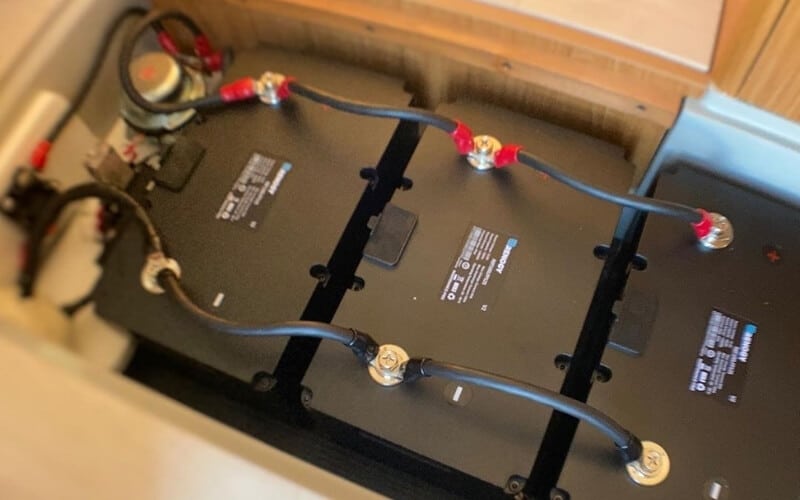
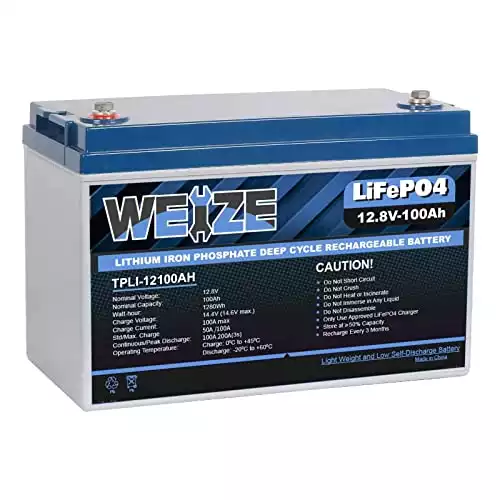
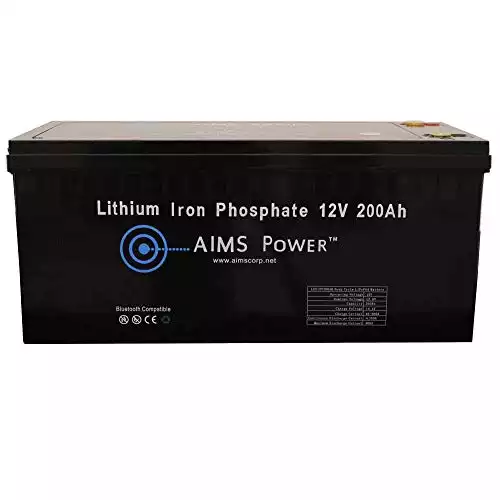
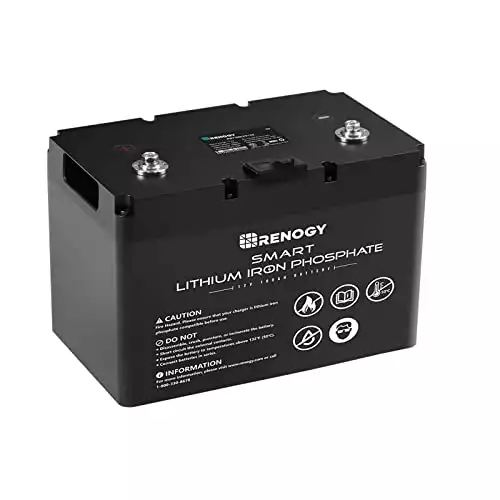
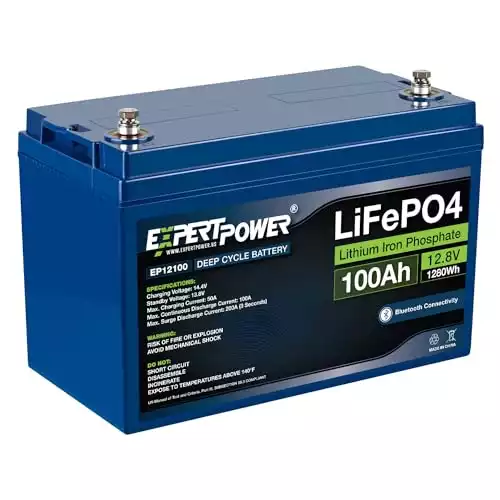
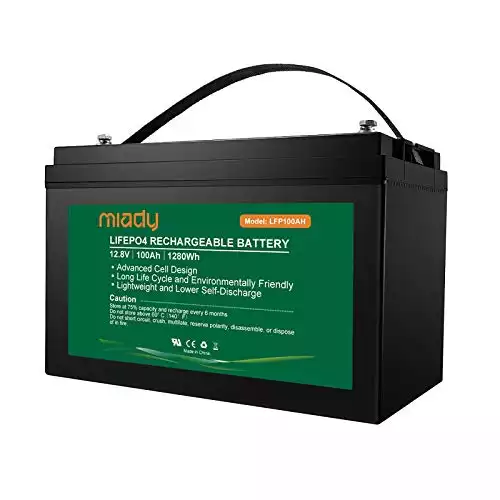
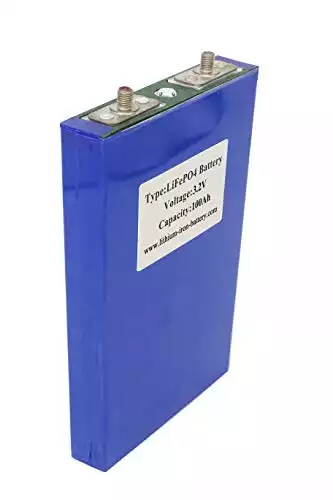

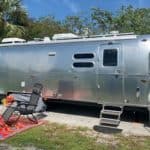


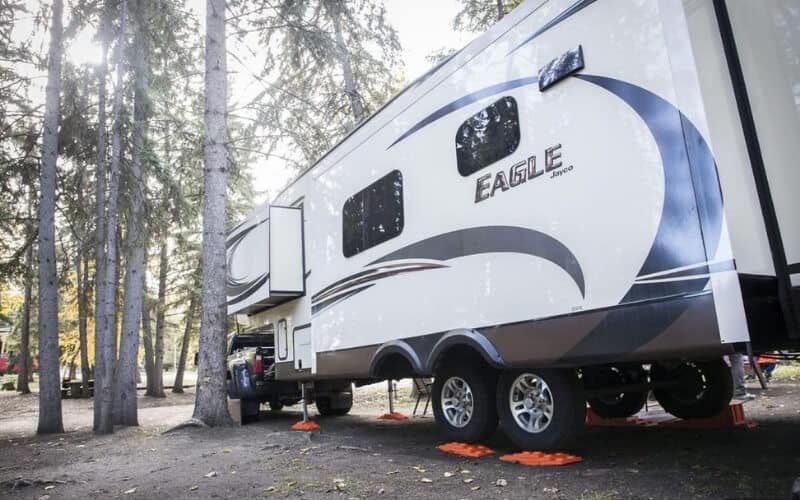
2 Comments
Travis Jones
2 years ago” I have read your blog and would like to add a few points. Lithium batteries have been used in RVs for a very long time as they are energy efficient and could hold a charge for an extended period. While rechargeable batteries aren’t new, there are some advances that newer models can offer.
For instance, Lithium-ion batteries can now be charged faster and retain their charge for longer periods. They also have an extended battery life compared to nickel-based ones. Lithium-ion batteries are also lighter and more compact than nickel-based ones. Thank you for sharing such helpful information with us.”
Dalton Bourne
2 years agoI’ve used sealed lead-acid batteries in the past (and UPG batteries before that), but I heard from a friend that while sealed batteries are a good choice, I should consider a longer-lasting battery to avoid the need to worry about finding a replacement every few years. So I decided to go with a lithium battery for my RV. I trusted and opted for the deep cycle battery from Battle Born. It weighs just 29 pounds, a lot lighter than the 63-pound UPG batteries I’ve had, and the extra weight of the UPG batteries is just a load. That’s why, despite the fact that these AGM batteries are perfectly adequate for my system, I adore them.